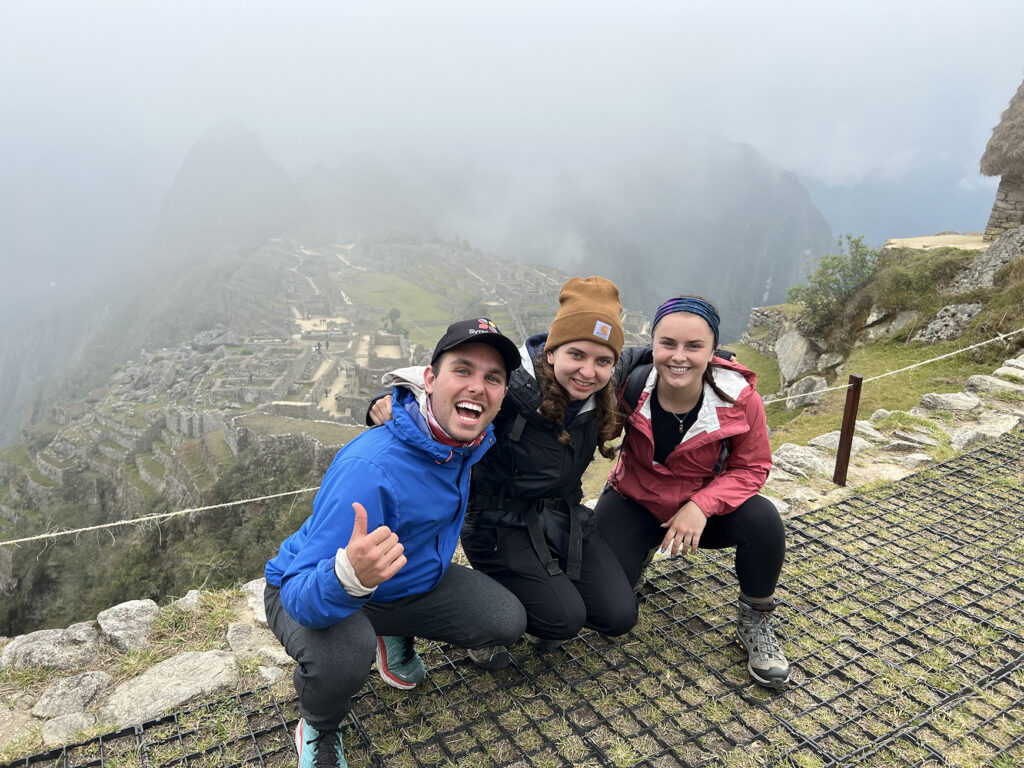Do You Need to Speak the Language to Study Abroad? Here’s What You Should Know


If you’re thinking about studying abroad but feel uncertain about your language skills, you’re not alone. Many students wonder if they meet the language requirements for study abroad programs or whether they are fluent enough to participate.
The good news? In most cases, you don’t need to be fluent to study abroad. In fact, many programs are designed to support beginners and help you build language skills along the way.
In this guide, we’ll explore the language requirements for study abroad, how different programs support language learners, and how you can get the most out of your experience, regardless of where you’re starting.
What are the language requirements to study abroad?
Language requirements for study abroad programs vary depending on your destination and the structure of the program. Some programs, especially those taught in English, don’t require any prior language experience. Others, particularly direct-enrollment or immersion programs, may expect you to have a basic level of proficiency or take a language course as part of your experience.
Keep in mind:
- Programs do not always require fluency. Many students are surprised to learn that fluency isn’t always necessary, especially for English-taught programs, like many of the IFSA Buenos Aires, Argentina options.
- Understand how your language level is measured. Some universities use the Common European Framework of Reference for Languages (CEFR) to assess your current skill level and track progress, from beginner (A1) to advanced (C2). Learn more about how IFSA approaches language learning.
- Take a placement test if required. Many programs use them before and after your experience to place you in the right class and track your progress.
- Practice speaking and listening. Language learning often focuses on real-world communication to help you navigate daily life with more ease and confidence.
In fact, our programs are built with language learners in mind. Whether you’re starting from scratch or brushing up on the basics, you’ll have access to resources that help you build confidence and navigate daily life. Even if you’re nervous about the language barrier, remember that many programs offer support, and learning the local language, even just the basics, can make your experience much more rewarding.

In Marisa I.’s story “What Study Abroad Taught Me About Learning a New Language,” she recounts doubting her ability to overcome the language barrier in her Costa Rica immersion program—until encouraging advice from the Program Director shifted her perspective.
“He told me that I had to stop thinking like a translator, and more like a Spanish speaker–That I am making so much more work for myself, by changing every word I hear in Spanish to English in my head.
‘Well, how can I think like a Spanish speaker if I’m so used to thinking in English?’ I challenged him. The answer was simple. I had to embrace the language around me, rather than let it discourage me. The only way to do this was to immerse myself even deeper in the community.”
Marisa I., participating in the Universidad Nacional Partnership program in Heredia, Costa Rica.
Are there programs for students who aren’t fluent in the local language?
Yes, absolutely! Many study abroad programs are designed specifically for students who aren’t fluent (or even familiar) with the local language. No matter your starting point, there are programs that meet a wide range of language requirements for study abroad, from complete beginner to fluent.
Here are some programs offered in English in countries where it’s not the primary language:
- IFSA Tech Career Accelerator in Prague, Czech Republic. There are no language requirements and along with a team challenge project with a company, all students are welcome to seek internship placements.
- IFSA Business Career Accelerator in Barcelona, Spain. There are no language requirements to participate, but some internship placements may require four semesters of university-level Spanish or equivalent.
- IFSA Buenos Aires in Argentina. This program offers multiple tracks including business and economics, health sciences, psychology and neuroscience, and pre-veterinary medicine to make the most of your academic experience.
- IFSA Sri Lanka. With no language requirements, students have the opportunity to take a beginner Tamil course.
- IFSA Shanghai in China. This program is taught in English but offers multiple language learning tracks from beginner to advanced Chinese courses.
- IFSA Rome in Italy. You’ll have the opportunity to learn Italian through beginner classes, complete directed research, or enroll in Luiss University international classes.
Six benefits of learning a language abroad
Learning the local language while studying abroad opens the door to a more immersive, rewarding, and meaningful experience. It’s more than just a practical skill — it deepens your connection to the place and the people around you. Here are a few reasons why it matters:
- Building a deeper understanding. Language and culture go hand in hand. When you learn the language, you’re also learning how people think, communicate, and connect, giving you deeper insight into daily life.
- Making everyday interactions easier. From ordering food to navigating transportation, speaking the language makes everyday tasks smoother and less stressful.
- Forming stronger connections. Even small efforts to speak the local language show respect and openness, which can lead to more meaningful relationships with host families, classmates, and locals.
- Boosting your resume. Language skills are a standout on resumes and grad school applications, showing employers that you’re adaptable, globally minded, and a strong communicator.
- Gaining confidence in unfamiliar situations. Learning to communicate in a new language helps you become more comfortable navigating uncertainty, whether you’re asking for directions, ordering food, or having your first conversation with a local. The more you practice, the more your confidence grows, both in the language and in yourself.
How can I improve my language skills before studying abroad?
After you’ve found a program that aligns with your goals and language requirements for studying abroad, you might want to brush up on your skills before departure.
Start by enrolling in a beginner-level class at your home university if one’s available. Even a few sessions can help you learn the basics and boost your confidence. If you prefer learning on your own time, try a language app like Duolingo, Babbel, or Memrise. These are great tools for building vocabulary and simple sentence structure while on the go.

“In the months leading up to studying abroad in Barcelona, I mentally prepared for communicating in Spanish.”
Evalyn P., Butler University, IFSA Barcelona Universities Program: UAB, Barcelona, Spain
Entertainment is another fun way to prepare. Watching shows or movies in your host country’s language (with subtitles on) can help train your ear and introduce you to everyday phrases. You might also try speaking out loud during your day-to-day routine, narrating what you’re doing or rehearsing phrases you’ll need abroad. Every student’s prep looks a little different.
Finally, learning a few cultural norms and politeness phrases can go a long way. Knowing how to say “thank you,” “excuse me,” or “Can you help me?” can turn a small interaction into a positive and encouraging one.

“Argentina is notorious for its specific dialect of Spanish and distinct accent. With this came a wealth of new vocabulary, far beyond the Spanish I learned in school in the United States.”
Olivia S., Smith College, IFSA Argentine Universities Program, Argentina
What’s the impact of study abroad on language learning?
At IFSA, language progress isn’t just something you hope happens, it’s something we actively encourage, support, and measure. Our language learning model includes both pre- and post-program assessments so students know where they’re starting and how far they’ve come. In 2024, 84% of students improved their language proficiency, with an average gain of .65 points on the TrueNorth scale—an AI-powered assessment used across multiple program sites, including Argentina, Mexico, and Spain. Read the full report.
Throughout the semester, students can check on their progress, receive individual coaching, and benefit from program elements such as field trips or host family placements, which are adjusted based on their skill level. This makes language learning more personalized, impactful, and sustainable.
Here are some additional reasons why studying abroad accelerates your language learning:
- Real-world practice. Unlike classroom learning, you’re applying your language skills in live, meaningful situations, like navigating a market, joining a conversation, or attending class.
- Immersive environment. Being surrounded by the language daily helps with vocabulary retention, pronunciation, and listening comprehension, sometimes without you even realizing it.
- Faster progress. Students often report more progress in one semester abroad than in multiple semesters of classroom study.
- Confidence growth. Once you’ve successfully asked for directions or ordered food in another language, your comfort level rises, and that builds momentum. According to IFSA’s end-of-program surveys, more than 90% of students reported gaining intercultural knowledge, developing new strengths, and improving comfort with diverse perspectives, a testament to how language and cultural immersion support long-term growth.
- Long-term impact. Even after they return home, many students find their language skills stick and inspire them to continue learning or even pursue global career paths.

“The more I practiced the language, even when I messed up, the more confident I felt. That confidence didn’t stop when I came home.”
Chris H., George Washington University, Pontificia Universidad Católica del Perú Partnership, Peru
Start your journey!
Studying abroad isn’t just about where you go, it’s also about how language shapes your experience. Knowing the language requirements for study abroad programs ahead of time helps you choose the right fit and start your journey with confidence.
With the right support and an open mind, you can learn as you go, make meaningful connections, and return home with stronger language skills, greater confidence, and unforgettable experiences.